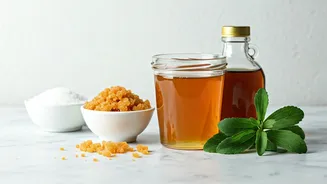Understanding Diabetes Risks
Diabetes is a significant health concern, and a critical factor in its management and prevention is managing dietary sugar intake. Refined sugar, a common
ingredient in many foods, can cause blood sugar levels to spike rapidly, contributing to the development or worsening of diabetes. This is why it’s essential to consider alternatives that offer sweetness without the same negative impact. Focusing on natural sweeteners can lead to better glucose control and overall health improvements. The goal is to make informed food choices that support stable blood sugar levels, helping to reduce the risk of diabetes complications.
Stevia: Nature’s Sweetener
Stevia, derived from the Stevia rebaudiana plant, has gained immense popularity as a sugar substitute. This natural sweetener is celebrated for its zero-calorie content and its lack of effect on blood sugar levels, making it ideal for those managing diabetes. Stevia is intensely sweet, often requiring only a small amount to achieve the desired level of sweetness. It's available in various forms, including liquid extracts, powders, and tablets, allowing easy integration into drinks, desserts, and cooking. Consuming stevia can help reduce sugar consumption, contributing to improved glycemic control. Its natural origin makes it a favorable option for anyone looking to reduce refined sugar from their diet.
Monk Fruit Magic
Monk fruit is another excellent natural sweetener. This sweetener originates from a fruit native to Southeast Asia and is known for its sweet taste. Similar to stevia, monk fruit is calorie-free and does not elevate blood sugar levels, making it a viable alternative for diabetics and those focusing on blood sugar management. Monk fruit sweeteners are extracted from the fruit and are available in various forms such as powders and liquid extracts. They add sweetness without the adverse effects of refined sugars. By incorporating monk fruit into your diet, it becomes easier to satisfy your sweet cravings while adhering to health-conscious eating habits, all without impacting your blood sugar levels. Monk fruit can be a simple swap to improve your overall health.
Xylitol: Sugar Alcohol Choice
Xylitol, a sugar alcohol, is naturally found in many fruits and vegetables. It's a popular sugar alternative because it tastes similar to sugar but has a lower glycemic index, meaning it causes a much smaller rise in blood sugar levels. Xylitol has a similar sweetness profile to that of sugar, allowing it to easily replace sugar in cooking and baking recipes. In addition to its low impact on blood sugar, xylitol can also promote dental health because it cannot be metabolized by the bacteria in your mouth that cause cavities. Although xylitol can be a good substitute, it's essential to note that excessive consumption can lead to digestive issues in some individuals. When used in moderation, xylitol is a useful sugar substitute to consider.
Erythritol: Another Sugar Alcohol
Erythritol is another sugar alcohol that provides a sweet taste with minimal effects on blood sugar levels. It's naturally present in some fruits and is often used as a sugar replacement. Erythritol has almost no calories and is easily tolerated by most people. Compared to other sugar alcohols, it's less likely to cause digestive upset. Erythritol is commonly found in a wide variety of sugar-free products and can be used in baking and cooking. Its mild sweetness makes it a versatile ingredient, and the lack of blood sugar impact makes it an excellent choice for individuals managing their glucose levels. Consider erythritol as a reliable and effective natural sweetener when looking to swap out refined sugar.
Maple Syrup's Place
Pure maple syrup, derived from the sap of maple trees, provides a natural sweetness with a lower glycemic index compared to refined sugar. While it does contain calories and carbohydrates, it also offers some essential minerals and antioxidants. Maple syrup should be used in moderation because of its sugar content, and it can be a better choice over refined sugar. Be sure to opt for 100% pure maple syrup rather than those that have added syrups, which may include high fructose corn syrup. Its natural source and distinctive flavor makes it a suitable option for adding sweetness to various dishes. Maple syrup can be a helpful addition to a balanced diet when consumed in moderate quantities.
Honey's Sweet Role
Honey is a natural sweetener produced by bees, and it has been used for centuries. Honey has a lower glycemic index than refined sugar, and it also contains small amounts of vitamins and antioxidants. Honey, like maple syrup, provides sweetness, but it still impacts blood sugar levels and should be used cautiously. It's a flavorful option that adds depth to teas, baked goods, and other recipes. For the best use, select raw, unprocessed honey. While honey offers additional nutritional benefits compared to refined sugar, moderation is the key. People with diabetes should monitor their blood sugar levels when using honey and consult with healthcare professionals to get recommendations for their individual needs.














![[WATCH] T20 World Cup 2026: Gautam Gambhir hosts dinner for Team India players ahead of Namibia clash](https://g-mob.glance-cdn.com/public/fc/image/7gXS1xdhs5Q0.webp)

